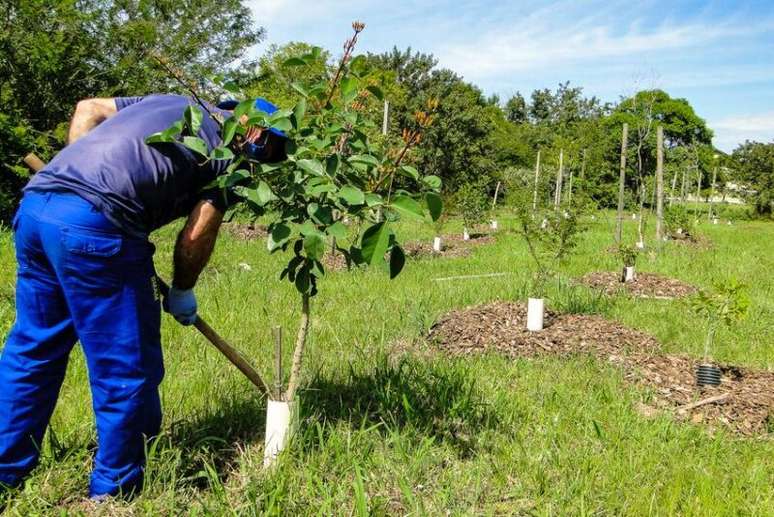-
At school everyone learns that Brazil got its name from the reddish, as if red-hot, Brazil tree.
Photo: Mauroguanandi wikimedia commons / Flipar
-
But there are morivores that have given rise to the name of every neighboring country on our continent. Then, see the curious explanations for the names of other South American countries.
Photo: Fsolda wikimedia commons / Flipar
-
Argentina – The name “Argentina” comes from the Latin “argentum”, meaning silver. During Spanish exploration in the 16th century, the conquistadors were attracted by the region’s mineral wealth.
Photo: Flipar
-
It was believed that the region may have large deposits of silver, hence the use of the name “Terra Argentina”, which refers to the “land of silver”. This name ended up being officially adopted, reflecting the expectation of mineral wealth that explorers had in the area.
Photo: image by sebastian del val from Pixabay / Flipar
-
Bolivia – Bolivia is named after Simón Bolívar, a revolutionary leader who played a crucial role in Latin America’s independence from Spanish rule.
Photo: public domain/Flip
-
After independence in 1825, the new nation was named Bolivia in honor of the liberator, known as “El Libertador” for his contributions to the fight for freedom and the creation of independent nations in South America.
Photo: image by infoisanavia from Pixabay / Flipar
-
Brazil – The name “Brazil” comes from the “pau-brasil” tree, which was one of the first resources explored by the Portuguese in the early colonial period.
Photo: public domain/Flip
-
The term “brazil” comes from the Latin “brace”, which refers to the red color of the heart of the tree. When the Portuguese arrived in the region in the early 16th century, the abundance of this red wood led to the country’s name, which eventually became its official name.
Photo: National Archives of Brazil / Flipar
-
Chile – The name “Chile” has several theories about its origin. It is suggested that it derives from the indigenous Mapudungun word “chili”, meaning “where the earth ends”.
Photo: public domain/Flip
-
Another theory suggests that the name may derive from the Quechua word “chiri”, meaning “cold”, in reference to the region’s climate. Regardless of the exact origin, the name “Chile” ended up becoming official for the country during the colonial period.
Photo: public domain/Wikimédia Commons/Flipar
-
Colombia – Colombia is named after Christopher Columbus, the Genoese explorer who discovered the Americas for Spain in 1492.
Photo: Disclosure / Flip
-
After Colombia’s independence from Spanish rule in 1819, the new nation’s leaders decided to name the country after the explorer, in recognition of Columbus’s influence in the discovery and exploration of the New World.
Photo: Flickr g_pertuzzy / Flipar
-
Ecuador – The name “Ecuador” comes from its geographic location along the Equator, which runs through the country. When Ecuador became independent from Spain in 1830, the name was chosen to reflect the country’s location on the equatorial line.
Photo: public domain/Flip
-
The name “Ecuador” symbolizes the country’s connection to the line dividing the Northern and Southern Hemispheres.
Photo: image by DEZALB from Pixabay / Flipar
-
Guyana – The name “Guiana” comes from the indigenous word “guihana”, which means “land of many waters” in the language of the Amerindian peoples of the region.
Photo: image by jorono from Pixabay / Flipar
-
This name reflects the abundance of rivers and bodies of water in the country. When Europeans arrived in the region in the 17th century, the name was adopted to refer to the vast area rich in water and natural resources.
Photo: Image by Robson Machado from Pixabay / Flipar
-
Paraguay – There aren’t many mysteries here. The name “Paraguay” comes from the Paraguay River, which runs through the country and also flows through Brazil, Bolivia and Argentina.
Photo: public domain/Flip
-
The word “Paraguay” comes from the indigenous Guarani term “paraguay”, meaning “river coming out of the sea” or “large river”. The name of the country reflects the historical and geographical importance of the river to the region and the influence of indigenous cultures in the formation of national identity.
Photo: – Image by Viktor Kisman from Pixabay / Flipar
-
Peru – The name “Peru” is of uncertain origin, but is believed to derive from the word “birú”, used by the Spanish to refer to the region at the beginning of colonization.
Photo: Flipar
-
It is believed that “birú” may derive from an indigenous word used to describe an area or a local leader. Over time, the name “Peru” was officially adopted and became the name of the nation after independence from Spain.
Photo: image by Georges GATTO from Pixabay / Flipar
-
Suriname – The name “Suriname” comes from the indigenous term “Surname”, used by native populations to refer to the region.
Photo: Freepik image / Flipar
-
The name was registered by European colonizers and was officially adopted when the country became independent from Great Britain in 1975. The name “Suriname” reflects the indigenous cultural heritage and historical connection to the region before colonization.
Photo: Flickr Andrey Sulitskiy / Flipar
-
Uruguay – The name “Uruguay” comes from the indigenous Guarani language and is believed to mean “river of snails” or “river of birds”.
Photo: Flipar
-
The term is a combination of the words “uru” (snail or bird) and “guay” (river). The choice of name reflects the influence of the Guarani language in the region and the importance of bodies of water to the country’s geographical identity.
Photo: Fulviusbsas/Wikimedia Commons/Flipar
-
Venezuela – The name “Venezuela” means “Little Venice” and was given by Spanish explorers in the 16th century, who observed similarities between the floating buildings of the local inhabitants and the Italian city of Venice.
Photo: Flipar
-
The term “Venezuela” was adopted to describe the region and eventually became the country’s official name following independence from Spain. The name reflects the historical and cultural connection to European exploration and perception of the region.
Photo: Guillermo Ramos Flamerich/Wikimédia Commons/Flipar
To share
Source: Terra
Rose James is a Gossipify movie and series reviewer known for her in-depth analysis and unique perspective on the latest releases. With a background in film studies, she provides engaging and informative reviews, and keeps readers up to date with industry trends and emerging talents.







